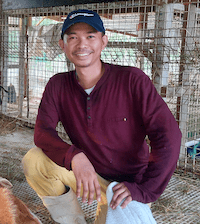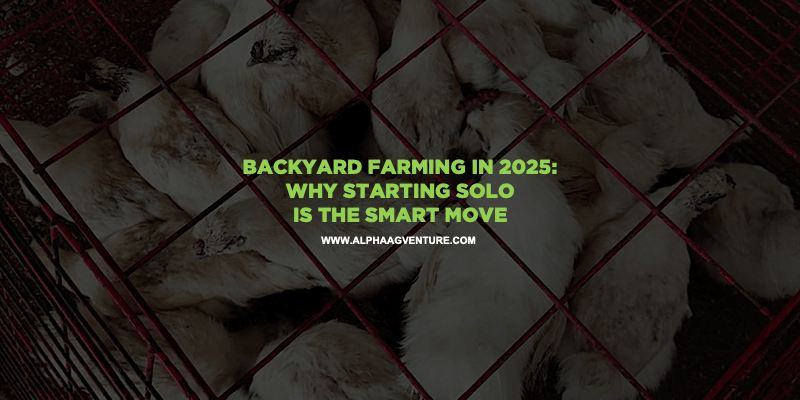Are you still deciding whether to hire a caretaker or handle all the tasks on your farm by yourself? What are the advantages of starting on your own? Let’s explore why managing your backyard livestock farming solo can be a smart move and how it can set you up for success in the long run.
1. Discipline
If you already have self-discipline, managing your backyard farm solo will elevate it to the next level.
Procrastination will disappear from your vocabulary. When you know that any task you postpone today will still need to be done tomorrow—and by you, no less—you’re more likely to buckle down and get it done. This habit ensures that your productivity remains high, and over time, you develop an impeccable work ethic that will benefit your farm and any other pursuits.
Handling everything yourself also sharpens your time management skills. You’ll learn to prioritize tasks such as feeding livestock, cleaning enclosures, and monitoring health. With no one else to delegate to, every minute of your day counts, and you become adept at balancing multiple responsibilities.
2. Skill Development
Starting solo forces you to become both versatile and resourceful. You’ll need to acquire a range of skills, from livestock nutrition to basic veterinary practices. Here are some areas where you’ll grow:
- Livestock Care: You’ll learn about feeding schedules, the right types of feed, and how to recognize signs of malnutrition or illness. This knowledge ensures your animals stay healthy and productive.
- Health Management: Basic veterinary skills like administering vaccinations, treating minor injuries, and identifying symptoms of common diseases become second nature. These skills can save you time and money while reducing reliance on external help.
- Farm Maintenance: You’ll gain expertise in maintaining and repairing livestock housing, fencing, and feeding systems. Being hands-on with these tasks ensures everything is functional and safe for your animals.
- Resourcefulness: Limited resources will challenge you to think creatively. For instance, you might devise cost-effective solutions for cooling animal shelters in the summer or composting waste for organic fertilizer.
These skills not only improve your confidence but also prepare you to train and manage future staff effectively. When you’ve mastered the basics, you’re better equipped to scale up operations. You’ll learn these things in my goat farming seminar, chicken farming seminar, and Pekin duck farming seminar, by the way.
3. Cost Efficiency
Operating your farm solo significantly reduces labor costs. Without a caretaker to pay, you can redirect those savings toward other critical investments. Consider the following examples:
- Improving Infrastructure: Use your savings to upgrade housing facilities, ensuring your livestock are comfortable and protected from extreme weather.
- Better Breeds: Investing in higher-quality livestock breeds can improve productivity, whether it’s higher milk yields, faster growth rates, or better meat quality.
- Feed Quality: Allocating funds toward premium feed can enhance the health and performance of your animals, leading to better returns.
By reinvesting your savings wisely, you can build a more sustainable and profitable operation. Plus, running your farm within a lean budget from the start teaches financial discipline, which will benefit you as your farm expands.
4. Freedom in Decision-Making
When you’re the sole decision-maker, you have full control over your farm’s direction. This freedom eliminates the need to consult others or wait for approvals, allowing you to act swiftly and efficiently. Here’s why this is advantageous:
- Faster Problem-Solving: Whether it’s a health issue with your livestock or an equipment breakdown, you can address problems immediately without waiting for input.
- Adaptability: Farming often requires quick adjustments due to factors like weather changes or market fluctuations. Being in charge of all decisions enables you to adapt your strategies without delay.
- Personal Vision: Starting solo allows you to build your farm based on your own goals and principles. Whether your focus is on organic practices, sustainable systems, or high-profit margins, you’re free to shape your operations as you see fit.
This level of autonomy is empowering and ensures that every success reflects your hard work and vision.
5. Personal Connection
Being hands-on with your farm fosters a deeper bond with your livestock. This connection goes beyond routine tasks; it’s about truly understanding your animals’ behaviors, needs, and well-being.
For instance, you might notice subtle changes in their appetite or energy levels that could indicate early signs of illness. This attentiveness not only improves animal welfare but also enhances productivity, as healthy livestock perform better.
Moreover, this personal connection can make farming more fulfilling. Watching your animals thrive under your care is rewarding and serves as a constant reminder of why you chose this path.
6. Building a Strong Foundation
Starting solo allows you to lay the groundwork for a sustainable and resilient farm. Here’s how:
- Customized Systems: You can create systems tailored to your specific needs, from feeding schedules to waste management protocols. These systems can later be standardized and documented, making it easier to onboard new staff when you’re ready to expand.
- Understanding Every Aspect: Managing every part of the farm yourself gives you a comprehensive understanding of its operations. This knowledge is invaluable when delegating tasks in the future, as you’ll know exactly what to expect and how to measure performance.
- Long-Term Vision: Building your farm from the ground up ensures that every aspect aligns with your long-term goals. This solid foundation will support your growth and make your operations more scalable.
7. Personal Growth
Beyond the practical benefits, starting your backyard livestock farm solo is an opportunity for personal development. You’ll cultivate traits like resilience, problem-solving, and adaptability—qualities that extend far beyond farming.
Challenges like juggling multiple responsibilities, dealing with unforeseen setbacks, or mastering new skills will test your limits. However, overcoming these challenges will leave you stronger and more confident in your abilities.
When to Consider Hiring Help
While starting solo has numerous advantages, there may come a time when hiring help becomes necessary. Here’s how to determine if you’re ready:
- Documented Systems: Ensure you have clear, written processes for every aspect of your farm. This documentation will make it easier to train new employees and maintain consistency in operations.
- Increased Workload: If the workload becomes too much to handle or starts affecting the quality of your operations, it’s time to bring in extra hands.
- Focus on Growth: As your farm expands, delegating routine tasks can free up your time to focus on strategic decisions and scaling your business.
Hiring help doesn’t mean relinquishing control; it’s about building a team that shares your vision and supports your goals.
Final Thoughts
Starting a backyard livestock farm on your own isn’t just about saving money or proving independence. It’s an opportunity to learn, grow, and create a business that’s truly yours. By embracing the challenges and rewards of solo farming, you lay the foundation for a sustainable and successful venture.
When the time comes to expand and bring in additional help, you’ll do so from a position of strength and knowledge. Until then, enjoy the journey of building something meaningful, one step at a time.
Let me know if you’re looking for a farm consultant to guide you through the process for expert advice and support.

Mr. Jaycee de Guzman is a self-taught agriculturist and the founder and patriarch of Alpha Agventure Farms, recognized as the leading backyard farm in the Philippines. With a rich background in livestock farming dating back to the early 1990s, Mr. de Guzman combines his expertise in agriculture with over 20 years of experience in computer science, digital marketing, and finance. His diverse skill set and leadership have been instrumental in the success of Alpha Agventure Farms.


